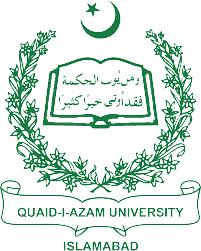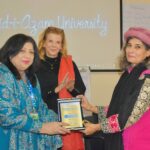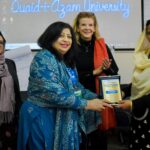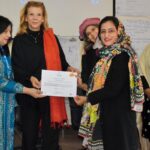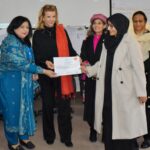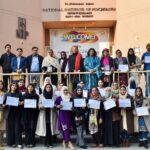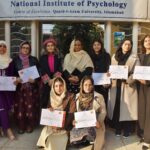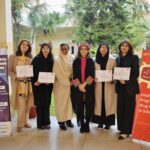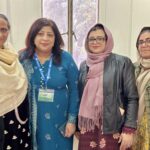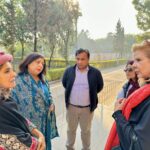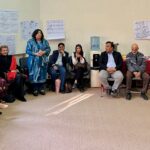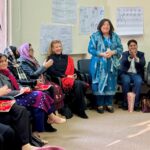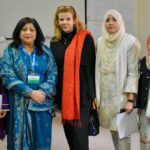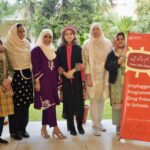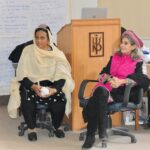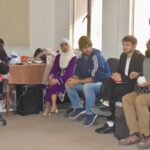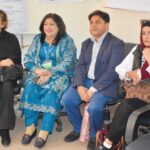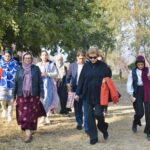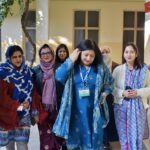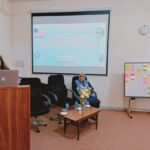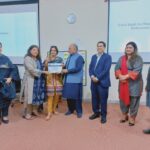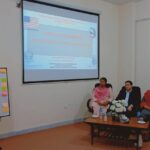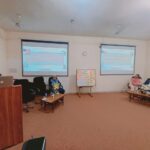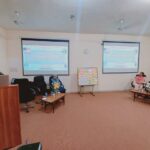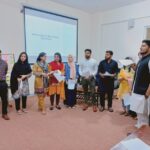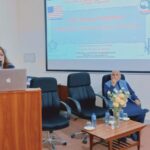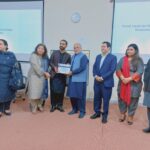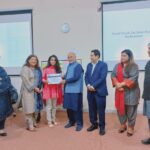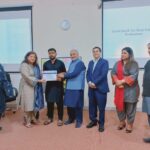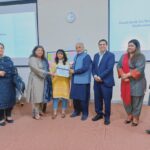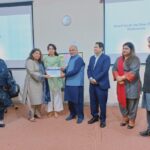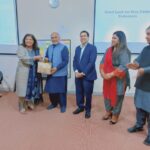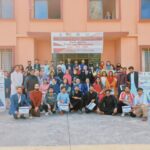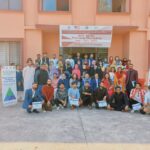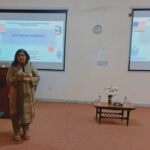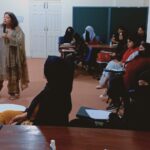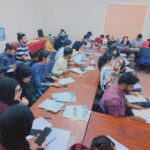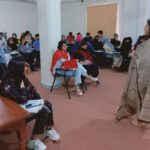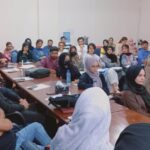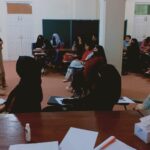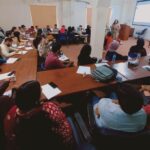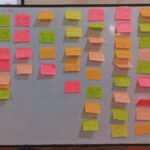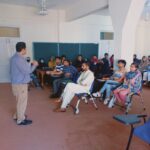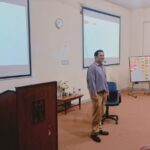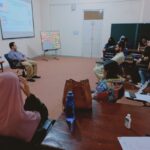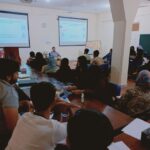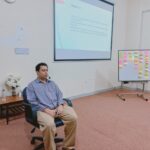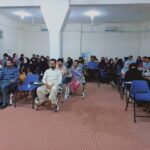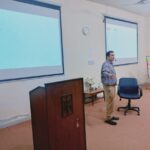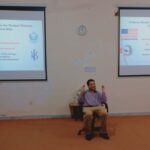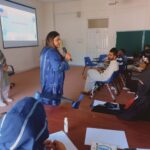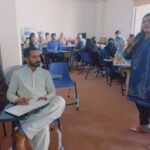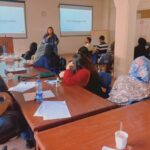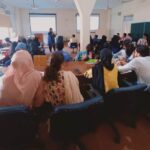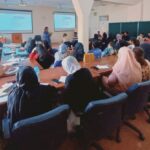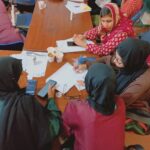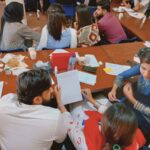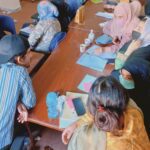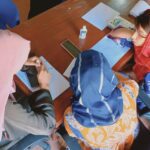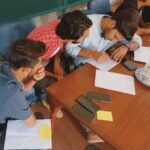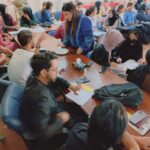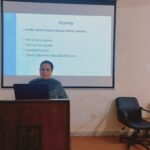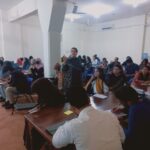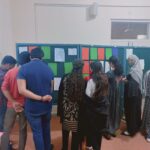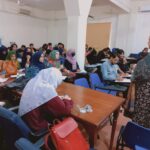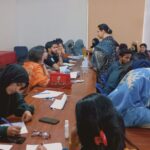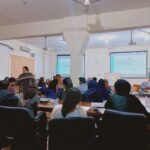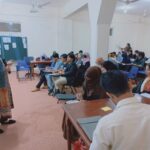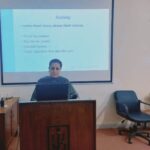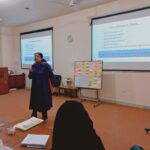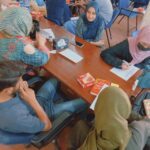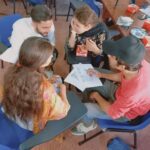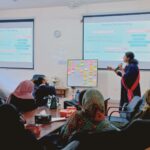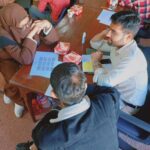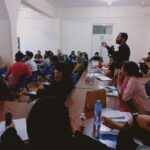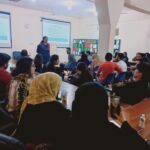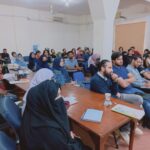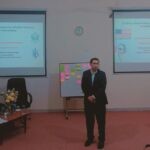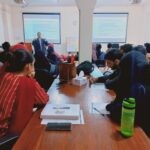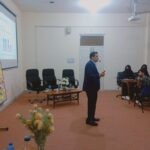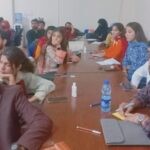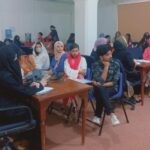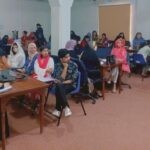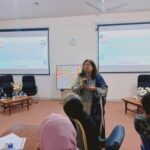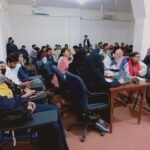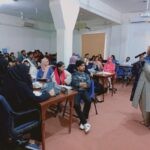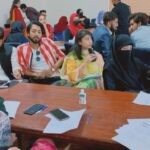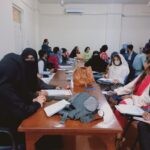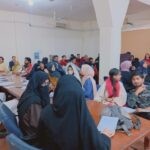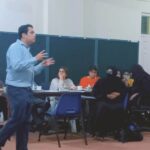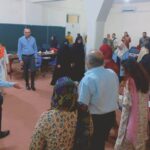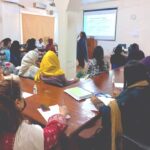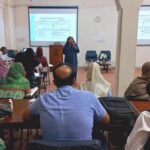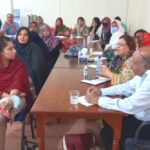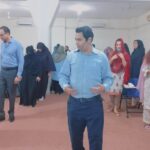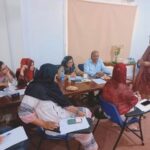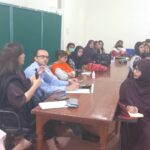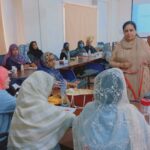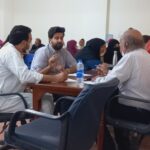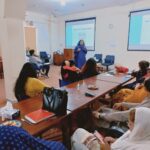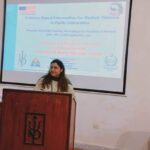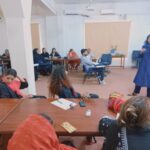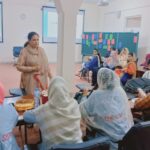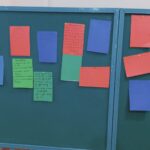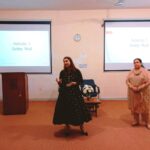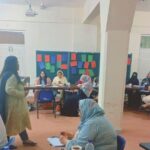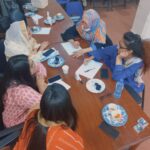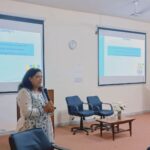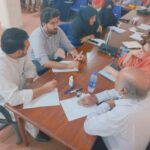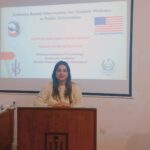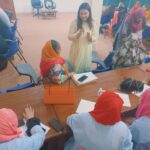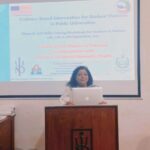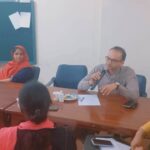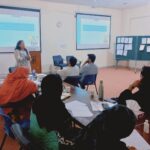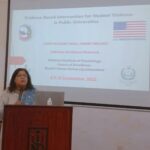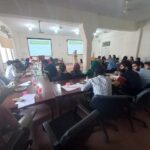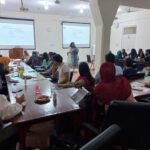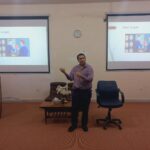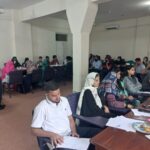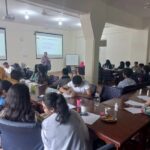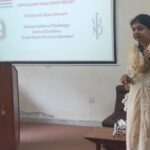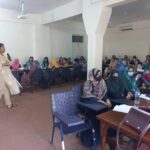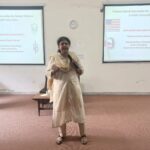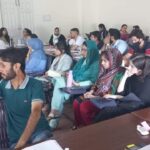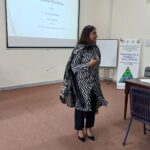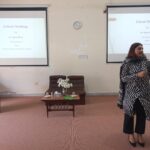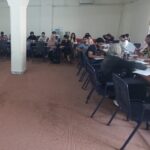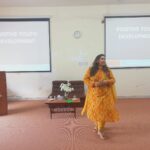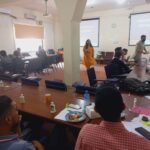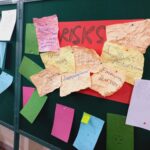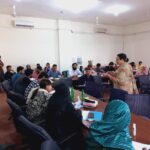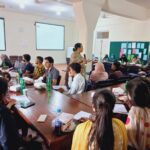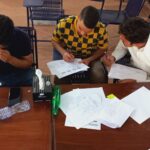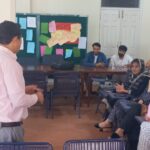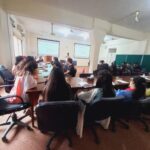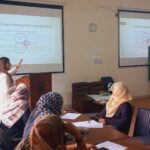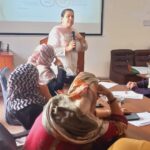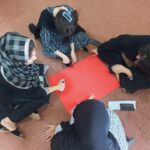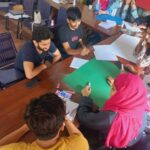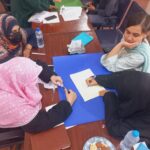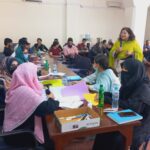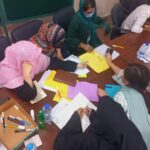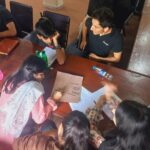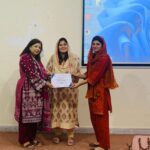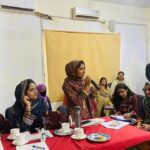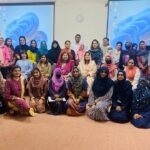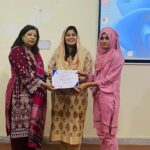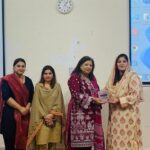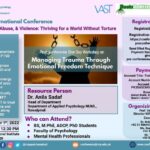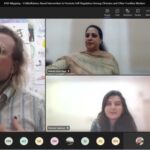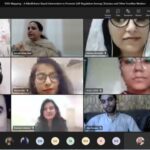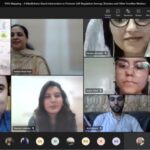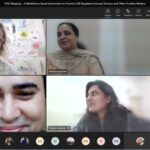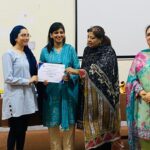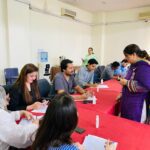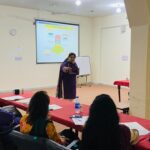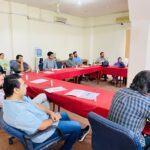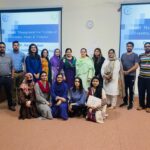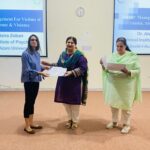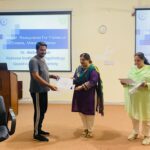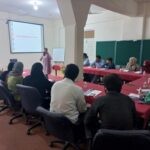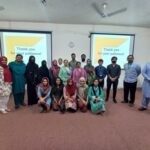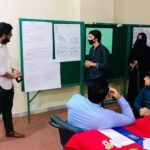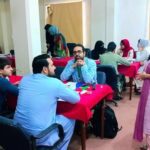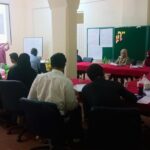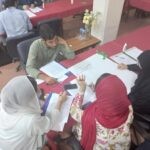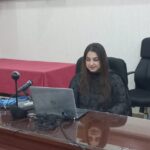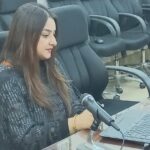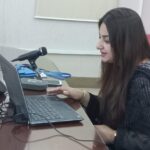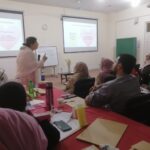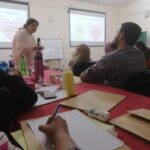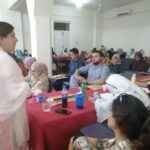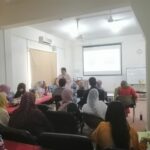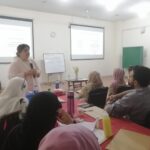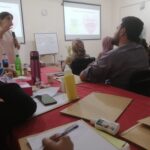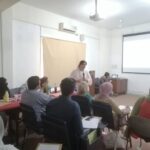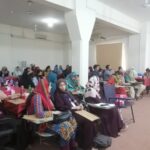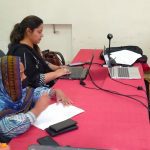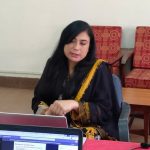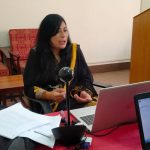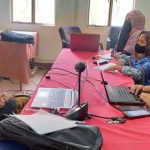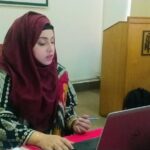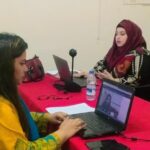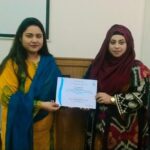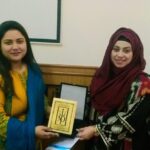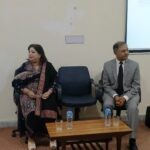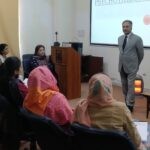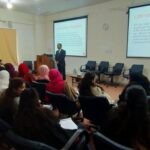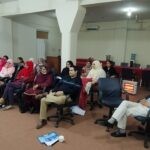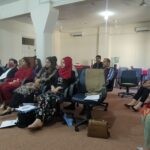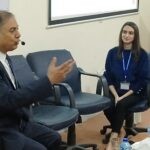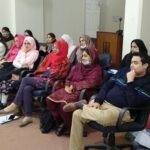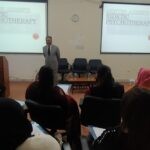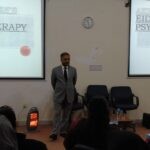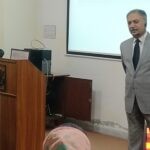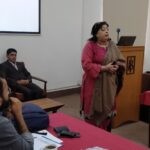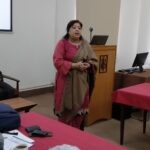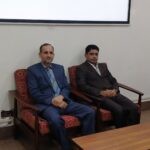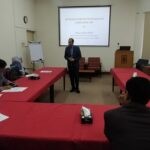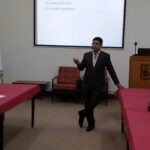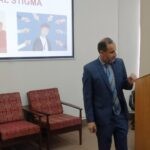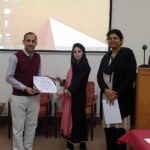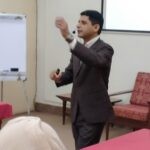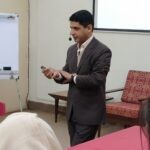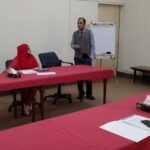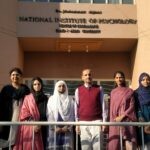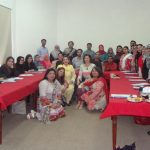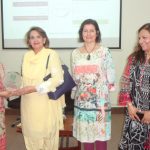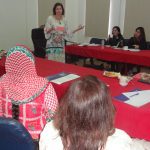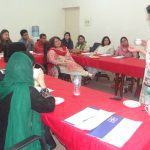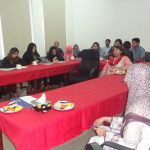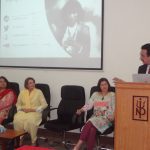Workshops at NIP
4-day training workshop on
Hum Sath Hain: Drug Prevention in Schools, Life Skill Training
10-13th Jan. 2024
The National Institute of Psychology (NIP) recently conducted a four-day training workshop held from January 10th to 13th, 2024 in collaboration with the Karim Khan Afridi Welfare Foundation (KKAWF) on “Hum Sath Hain: Drug Prevention in Schools, Life Skill Training.” The workshop introduced the Unplugged program, a school-based drug prevention curriculum implemented and evaluated in seven European Union countries, West Africa, and South America. Currently being implemented in Pakistan by KKAWF with the technical assistance of UNODC. The workshop was carried out by esteemed resource persons, Ms. Lubna Ghani Hayauddin (International Master Trainer) and Prof. Tasnim Akhtar (Master Trainer). Participants from multiple organizations, along with a substantial number of NIP students and alumni, attended the workshop.
The main agenda, titled “Unplugged Hum Sath Hauin,” focused on helping youth identify, understand, and manage emotions. This interactive program emphasized the value of positive student-teacher interactions to strengthen life skills and social cognitive influences. The Unplugged program comprises 12 lessons covered over four days.
On the workshop’s last day in conclusion ceremony the Director of the National Institute of Psychology, Prof. Dr. Rubina Hanif, and Mrs. Cristina Von Sperling Afridi, Chairperson of KKAWF were invited for distributing certificates among participants for successful workshop completion. Prof. Dr. Rubina Hanif distributed shields and extended gratitude to the resource persons for providing a platform for young researchers and professionals to discuss practical aspects of drug prevention. She also commended the efforts of the organizing committee for arranging the successful workshop.
Skill Development Series of Workshops for Students Parents, Teachers through USEFP Project
Closing Ceremony of Series of Training Workshops
October 21, 2022
National Institute of Psychology, Quaid-i-Azam University inaugurated its series of workshops on September 8th, 2022. The series of workshops are particularly tailored for developing soft skills in students, parents and teacher to counter with violence in public universities.
Afternoon of October 21st, 2022 brought about delight of successful completion of final phase of the project “Evidence-Based Interventions for Students Violence in Public Sector Universities in Islamabad”. Dean Social Sciences, Quaid-i-Azam University, Dr. Muhammad Idrees, graced the occasion with his presence. Dr. Nelofar Kiran Rauf hosted the closing ceremony. Prof. Dr. Rubina Hanif presented her welcome note in which appreciated the entire team of project for their enthusiasm for the project, students for their three-day dedication for learning, and Dr. Idrees for their presence and immense support for creative and constructive initiatives of Director, Prof. Dr. Rubina Hanif. Peace ambassadors, selected during previous training workshops, were also invited to the event. Ms. Arooj Mujeeb presented the detailed community action plans of ambassadors, appreciated their efforts, and assured the supervision of their proposed community action plans by team members of USEFP project. Additionally, new ambassadors were also announced and their brief credentials were presented for audience. Finally, certificates were distributed among all participants of training workshop.
Arooj Mujeeb
Lecturer
Inaugural Third Series of Training Workshops with Students
October 19-21, 2022
National Institute of Psychology, Quaid-i-Azam University inaugurated its series of workshops on September 8th, 2022. The series of workshops are particularly tailored for developing soft skills in students, parents and teacher to counter with violence in public universities. NIP inaugurated third series of training workshops with students on October 19, 2022 under USEFP project “Evidence-Based Interventions for Student Violence in Public Sector Universities in Islamabad”.
Day-1:Session-1
The opening session of the series of workshops was about “Social Intelligence” which was conducted by Prof. Dr. Rubina Hanif. She successfully highlighted the significance of emotional/social intelligence along with development of Intelligence Quotient (IQ) because IQ can take an individual till door of an organization but social intelligence makes the individuals flourish in their respective places. Detailed discussion and activities were conducted for teaching the skills which have potential to enhance social intelligence. Some of these strategies included tapping the emotions, building social connectedness, stress management, conflict management, learning life skills, and practicing positive behaviors. Social intelligence can be produced for oneself as well as for others through mindfulness and empowerment. Mindfulness for oneself and others included self-awareness and social awareness whereas; empowerment for oneself and others included training for self-management and relationship management to be more socially intelligent.
Day-1:Session-2
Second session of the training workshops was about “Mastering the Self” which was conducted by Mr. Haider Shishmahal. The session emphasized on self-observation in order to overcome the hurdles which hinder the progress of the individuals for mastering the self. One of the tools, which resource person used to teach audience about self-connectedness, was meditation.
Day-1:Session-3
Third session of the first day of training workshops was conducted by Ms. Arooj Mujeeb on “Positive Youth Development”. Session started with a discussion about the age range and characteristics of the youth which are prevalent worldwide and included the concept of ecological model, protective and risk factors, key principles of youth development, and research-based youth needs. All of the concepts were taught through hand-on activities.
Day-2:Session-1
Inclusion, Equity, and Diversity was the first session, conducted by Dr. Nelofar Kiran Rauf, on the second day of the training workshops. Concept of diversity was explored through an activity in which participants needed to explore the meaning and origins of their names and understand that diversity exists even in us. Acceptance, respect, and making diverse people part of the process is called inclusion whereas; distribution of resources according to various groups needs is known as equity. She emphasized that diversity should be like baking a cake where diverse ingredients produce something worthwhile. Honesty, courtesy, understanding, communication, dignity, respect, confidentiality, compassion, and kindness are some of the keys to produce diverse, inclusive, and equated communities.
Day-2:Session-2
Second session of the second day of training workshops was “Promoting Safe Environment” which was conducted by Dr. Nelofar Kiran Rauf. Session started with a discussion in which audience indicated that physical, psychological, and emotional safety is what they understand from the topic of the session. Four key areas of safety were made part of the lecture and activities of the session which included Learner’s safety, Inclusion safety, Contributor’s safety, as well as Challenger’s safety to promote safe environment for university students.
Day-2:Session-3
Ms. Raiha Aftab conducted the third session titled “Ethics, Values, and Morality”. The session started with an imagery activity to let people know the things which carry significant value in their lives. Morality is the idea of fairness and justice and ethics are the standards which affect the conduct of the individuals. Resource person emphasized moral values, aesthetic values, instrumental values, performance values, and intrinsic values through a hands-on activity. Additionally, adding the aspect of critical thinking (and its techniques of Evaluating, Understanding, Identification, Problem solving, Perspective taking, and Asking hard questions) equipped audience with better tools to analyze their values, morality, and ethics.
Day-3:Session-1
First session of the third day of workshop was conducted by Mr. Haidar Shishmahal on conflict management. The session was helpful in developing insight of the sources which may cause conflict in individuals’ lives. Resource person also highlighted the values which may cause intrapersonal conflict. The session was helpful in understanding the causes and strategies for handing conflict.
Day-3:Session-2
Second session on the third day was titled “Psycho-Social Toolkit for Students” and the session was delivered by Prof. Dr. Rubina Hanif. Resource person overviewed all the skills which had been taught in three-day training workshops and presented the audience with skills which can make their functioning better (e.g., resilience, emotional intelligence, relationship building etc.). The session was ended with a meditation activity.
Inauguration of Second Series of Workshops for Parents and Teachers
for Countering Violence in Public Universities
September 28-30, 2022
National Institute of Psychology, Quaid-i-Azam University inaugurated its series of workshops on September 8th, 2022. The series of workshops are particularly tailored for developing soft skills in students, parents and teacher to counter with violence in public universities. The inauguration ceremony started with the welcome note of Director Prof. Dr. Rubina Hanif where she introduced the project and its various modules.
Day-1
First session of the training workshops series was “Developing Social Intelligence: Role of Teachers and Parents”. The session was conducted by Prof. Dr. Rubina Hanif who started with introducing the project and preceding sessions to parents and teachers. The purpose of the session was sensitizing parents and teachers about the role which social intelligence can play in all spheres of life and activitis on strategies which can help them in enhancing the social intelligence of youth.
The second session of the training day-1 was conducted by Ms. Raiha Aftab on goal setting. The primary objective of the session was to orient teachers and parents with importance and strategies for goal setting. The session started with an imagination activity where audience was directed to imagine their 80th birthday and accomplishments in order to make people realize their life goals. Resource person highlighted the value of developing SMART goals which are Specific, Measurable, Attainable, Relevant, as well as Time-based. Audience was taught to develop detailed action plans for their goals, through group activity, using SMART goals.
Session three of the training workshop was conducted by Mr. Haider Shishmahal on Conflict Management. The major objective of the session was to sensitize parents and teachers regarding root causes of the conflict and letting them know about the strategies through which they are able to deal with conflicts in their daily life situations.
Day-2
On day-2 of the training, four training session were conducted for parents and teachers. First session was conducted by Dr. Nelofar Kiran Rauf on topic of “Inclusion, Equity, and Diversity” which focused on training the youth in a way through which they will learn these concepts and the problems of violence in universities will lessen ultimately.
The second session was conducted by Dr. Saira Khan on “Promoting Safe Environment” in which she highlighted the different forms of safety including emotional, psychological, and environmental safety.
Third session, titled “Positive Youth Development” was conducted by Ms. Arooj Mujeeb and the rationale of the session was highlighting the physical, psychological, and emotional changes which youth go through and how parents and teachers can play role in development of their identity, self-esteem, and productivity positively.
Fourth session was conducted by Ms. Raiha Aftab on “Ethics, Values, and Morality” and session concentrated on the developing all these characteristics in youth through their parents and teachers. All of the session used hands-on activities to make teachers and parents learn in the most effective way.
Day-3
Two training sessions were conducted on third day of training workshops.
The first session was conducted by Dr. Saira Khan on topic of “Critical Thinking”. The main objective of the session was to teach the audience regarding their own fixed thinking patterns and errors and to demonstrate the strategies through which they will be able to leave their comfort zones and start thinking critically in daily lives.
The second session was co-jointly conducted by Prof Dr. Rubina Hanif and Ms. Arooj Mujeeb on Psycho-Social Toolkit for Teachers and Parents. The session concentrated on the strategies which help an individual to grow psychologically and socially. Some of these strategies included taking ownership of feelings, cultivating open mindedness, perspective taking, practicing respect, building supportive social connections, challenging thoughts, and mindfulness.
Inauguration of Series of Workshops for Students, Parents, and Teachers
for Countering Violence in Public Universities
September 8-10, 2022
National Institute of Psychology, Quaid-i-Azam University inaugurated its series of workshops on September 8th, 2022. This three-day workshop is particularly tailored for developing soft skills in students to counter with violence in public universities. Fifty students from various departments of Quaid-i-Azam University, National University for Modern Languages, COMSATS University, and International Islamic University were recruited for the workshop. The inauguration ceremony started with the welcome note of Director Prof. Dr. Rubina Hanif where she introduced the project and its various modules.
Day-1:Session 1
First session titled “Social Intelligence: A Key to Success in Social World” was conducted by Director Prof. Dr. Rubina Hanif. The session started with an ice-breaking activity to familiarize the students with each other where they formed groups, wrote down their prominent personality characteristics on sticky notes and shared it with everyone else to develop a baseline understanding of dynamics of the entire group. Session emphasized the value of using emotional quotient (EQ) in daily life situations where self-awareness, social skills, self-regulation, and empathizing with others can help an individual to reap beneficial consequences. Students were provided with case studies in which they needed to identify the social interactions in which characters were using emotional intelligence while interacting with one another. Resource person emphasized the role of emotional intelligence during situations which can trigger conflicts. In order to overcome such situations, she conducted an activity in which students needed to challenge their thoughts which may trigger conflict and to alter those thoughts with positive ones. The session ended with take-home message of IMPACT where IMPACT referred to Insight of strengths and weaknesses, Motivation to overcome those weaknesses, Planning of procedure to achieve goals, Activities planning in right direction, Consolidation of learning, and Tracking of achievements throughout the process of enhancing emotional intelligence.
Day-1:Session 2
Second session on first day of workshops was conducted by Mr. Haider Shishmahal on “Mastering the Self”. He reflected upon the links between self-mastery and understanding of one’s civic responsibility with management of the risky behavior which may lead to violence in academic institutions. Two major techniques of self-management were self-observation and self-mastery. Mr. Haider used “Pairing and Sharing technique” while conducting activities on self-observation where small groups of students were asked to objectively identify the triggers and consequences of their risky behaviors. Later part of the session helped the students to learn the techniques through which they can master their behaviors in case of a triggering situation or thought and correct themselves before their behaviors manifest. As a mindfulness practitioner, Mr. Haider shared that meditation can help in developing self-observation and self-mastery and conducted Grounding Meditation activity which helped students to develop better focus.
Day-1: Session 3
The third session of the workshop was conducted by Ms. Raiha Aftab. It was based on the concept that human values, ethics and morality are the central essence of person ideology. This ideology of life determines how much adapt and thriving an individual is in his or her environment. At institutions, violence is caused by unmet expectations, damaged values, conflicting ethics and confused morality. Students can be trained to resist violence if they understand the processes involved in violent acts. The session highlighted factors that cause small incidents to escalate and become great episodes in which precious time, careers and lives are lost. In the end ways of enhancing tolerant values were identified.
Day-2: Session 1
First session of the second day was conducted by Dr. Saira Khan on a crucial skill for youth that is; critical thinking. The focus of the session was to make students understand how to use the processes of identifying, analyzing, reflecting, evaluating, and reasoning. Through different activities, the students were enabled to identify their own blockages and mental traps in order to stop the thinking pattern which may hinder their critical thinking skills.
Day-2: Session 2
The second session of the day was conducted by Ms. Arooj Mujeeb and the title of the session was “Positive Youth Development”. The focus of the session was on highlighting the need of positive development of youth residing in developing countries. The resource person emphasized the understanding of ecological system in order to look into the support system as well as risk factors which youth may face. To become productive and contributing adults of the society, youth needs to follow the 6Cs model where they are required to develop appropriate and relevant Competencies, Confidence, Character, Care, Connection, and Contribution.
Day-2: Session 3
Third session of second day of the workshop was conducted by Dr. Nelofar Kiran Rauf on “Inclusion, Equity, and Diversity” which highlighted the importance of diverse and unique demographic details of all the individuals. Session embedded the sense and value of inclusion of diverse people in the group and students learnt how a diverse group can work effectively in a group setting. Various activities were performed by the students through which resource person delivered the eight standards of dignity and respect (Honesty, Kindness, Compassion, Courtesy, Understanding, Confidentiality, Privacy, and Communication) to students.
Day-3: Session 1
The first session of third day of the workshop started with an inspiring session by Mr. Haider Shishmahal on the topic of “Conflict Management”. The primary objective of the session was orienting students with sources of conflict, understanding multiple perspectives surrounding the conflict, and creating a dispute resolution mechanism. Students were engaged in the activities through which they learnt about developing resolution mechanisms while agreeing on shared touchstone values.
Day-3: Session 2
The second session was the day was conducted by Dr. Nelofer Kiran Rauf and Dr. Saira Khan on topic of “Promoting Safe Environment”. The main focus of the session was on highlighting the need of psychological safety at universities as well as equipping the students with strategies to develop action plans which help them in creating safe environment around them.
Day-3: Session 3
The third session of the day was conducted by Director Prof. Dr. Rubina Hanif and Ms. Arooj Mujeeb titled “Psycho-social Toolkit for Students”. The focus of the session remained on development of various traits and skills which may benefit the students in the long run which included resilience, decision making skill, building supportive social connections, countering negative thoughts, building interpersonal relationships, as well as mindfulness. The entire session was activity based where students worked in groups. Session was concluded with reflections and feedback of students regarding 3-day training sessions.
Managing Trauma through Emotional Freedom Technique by
Dr. Anila Sadaf, HOD, Department of Applied Psychology,
NUML University, Rawalpindi Campus
1st Sept. 2022
National Institute of Psychology, Centre of Excellence, Quaid-i-Azam University, Islamabad successfully conducted post-conference workshop on topic of “Managing Trauma through Emotional Freedom Technique” on 1st September, 2022. The workshop was conducted by Dr. Anila Sadaf who is currently HOD of Department of Applied Psychology, NUML University, Rawalpindi Campus. The three-hour workshop was based on how EFT tapping is an alternative acupressure therapy treatment and is used to restore balance to disrupted energy. It’s been an authorized treatment for war veterans with PTSD, and it demonstrated benefits as a treatment for anxiety, depression, physical pain, and insomnia. The participants were able to differentiate between trauma, PTSD and ASD. The participants learned to diagnose patients with PRSD and ASD. The participants were able to practically demonstrate the EFT Emotional Freedom Technique. Workshop was attended by students as well as professionals which mostly included teachers who were working in colleges and universities. Expertise of the resource person and her grip on the topic was appreciated by all the participants.
IFAD-Mapping – A Mindfulness-Based Intervention to Promote Self-Regulation Among Clinicians and Other Frontline Workers by
Luke Felczak, Expressive Arts Therapist, Vancouver, Canada
21st July 2022
National Institute of Psychology, Centre of Excellence, Quaid-i-Azam University, Islamabad successfully conducted another preconference workshop (virtual mode) on topic of “IFAD-Mapping – A Mindfulness-Based Intervention to Promote Self-Regulation Among Clinicians and Other Frontline Workers”. There were 76 participants from various public and private universities of Pakistan.
The workshop was conducted by Luke Felczak who is currently working as an Expressive Arts Therapist in Vancouver, Canada. The four-hour workshop aimed to explain the clinicians, frontline workers, and anyone working directly with survivors of violence, consciously or unconsciously, employ their nervous system to co-regulate the nervous systems of the persons they serve. Importance of IFAD- Mapping, it is self-administered mindfulness-based intervention that frontline workers can use promote self-regulate before and after working with survivors of violence and their families. Objectives of workshop included to be able to describe what IFAD-Mapping is, be familiar with the philosophical, psychological, and psychotherapeutic basis of IFAD-Mapping. To engage in experiential learning by self- administering an IFAD-Mapping.
Art and Play Therapy for Trauma Treatment in Children
Dr. Uzma Masroor
19th July 2022
A workshop was conducted on “Art and Play Therapy for Trauma Treatment in Children” at the National Institute of Psychology, Quaid-i-Azam University, Islamabad. We had 41 participants from various institutions such as Nust University, Foundation University, Air University, Quaid-I-Azam University and Federal Public Service Commission. Dr. Uzma Masroor, our resource person helped define and understand Play and Art therapy (usually used as a combined approach) is most effective for children because attempts to bring resolutions to different traumatic experiences that might influence their long-term functioning as grown-up adults. Utilizing the techniques of Art and Play Therapy, a life-long experiential and observable change can be observed. The evidence has demonstrated that Art and play not only improve quality of life but are also effective for the cognitive abilities and emotional well-being of the children. Objectives of workshop included identifying different types of childhood trauma and prevalence in children and adults. To learn the process of case formulation and treatment plan. Learning and practicing different Art and Play Therapy techniques, specific to trauma treatment with hands-on practice.
Anger Management Among Victims of Trauma Abuse and Violence
Dr. Aisha Zubair
4th July 2022
A workshop on “Anger management among victims of trauma abuse and violence” was conducted on 4th July 2022 at National Institute of Psychology, Quaid-i-Azam University, Islamabad. Research supports that most of our accomplishments are based on how well we manage our anger and regulate our emotional skills; and Dr. Aisha Zubair, our resource person helped to identify threshold of anger, various forms of aggression one needs to manage and how can we use different strategies to cope with it at work to make us grow in our personal and professional life. The workshop focused on exploring triggers of anger, learning skills of self-awareness, understanding personal threshold of anger, social awareness, and the process of dealing with trauma and its related effects. The aim was to improve personal and team performance. Certificates were distributed after the workshop.
Tap into the Power of Emotions: Secret to Success at Work and Beyond
Dr. Sobia Masood
23rd June 2022
A workshop was conducted on Developing Emotional Intelligence at the National Institute of Psychology, Quaid-i-Azam University, Islamabad. Research supports that 80% of our success is based on how well we utilize our emotional potential; and Dr. Sobia Masood, our resource person helped define what emotions were and how can we make it work for us in our personal and professional life. The workshop focused on exploring the power of emotions, learning skills of self-awareness, self-management, social awareness, and relationship management. The aim was to improve personal and team performance. Certificates were distributed after the workshop
Personality Disorders Examination: Assessment and Diagnosis
Through DSM-V
Dr. Saira Khan
31st May 2022
May 31st, 2022 witnessed another successful day for National Institute of Psychology, Quaid-i-Azam University when a third online workshop was conducted. The topic of the online workshop was “Personality Disorders Examination: Assessment and Diagnosis Through DSM-V” and the resource person for the workshop was Dr. Saira Khan who has completed her PhD dissertation in personality disorders among clinical and non-clinical populations. This four-hour workshop was divided into four sessions including introduction and ice breaking, theoretical foundations, understanding DSM-VI-TR and DSM-V with the way forward for assessment, personality assessment tools alongwith their administration and scoring. Participation of students, as well as professionals, provided an opportunity for an interactive workshop where Dr. Saira Khan was successful in demonstrating the application and assessment of DSM-V and possible drawbacks while using it with certain religious and cultural groups.
Experiencing Autotelism: Going Beyond Boredom and Anxiety
Dr. Aisha Zubair
19th May 2022
A workshop was conducted by Dr. Aisha Zubair at the National Institute of Psychology on 19th May 2022. The workshop was titled Experiencing Autotelism: going beyond boredom and anxiety. The workshop was aimed at enhancing skills for transmuting anxiety and boredom, core sense of character, unremitting attention, effortless high performance, synchronized pursuit of happiness, and psychosocial saga of peak experiences. The workshop was attended by a large number of participants. They learned how to maximize their experiences and to ‘feel alive’ and to really experience the world in it’s real beauty. Certificates were distributed after the workshop.
Referencing and Result Writing Through APA-VII
Dr. Irum Naqvi
15th April 2022
National Institute of Psychology, Centre of Excellence, Quaid-i-Azam University, Islamabad successfully conducted another online workshop on topic of “Referencing and Result Writing Through APA-VII”. The workshop was conducted by Dr. Irum Naqvi who is currently working as Assistant professor at the institute. The three-hour workshop was distributed into three modules. These three modules included in-text citations and developing reference list; formatting of tables, figures, and images through APA-VII; and result writing which primarily focused on the parameters which must be discussed while interpreting the results of the tables. Every module of the workshop was followed by question answer session. Workshop was attended by students as well as professionals which mostly included teachers who were working in colleges and universities. Expertise of the resource person and her grip on the topic was appreciated by all the participants.
Skills Training for Children with Behavior Disorder
Ms. Sadaf Arif
30th March 2022
On 30th March, 2022, a one-day an online skills training workshop for children with Behavior Disorder was conducted at NIP by Ms. Sadaf Arif, an Applied Behavior Analyst and registered Behavior Technician (BACB, USA). The key topics covered by the resource person included parental stress management, enhancing positive family interaction skills, procedure for therapists and psychologists to help parents and examining and changing patient thoughts.
Eidetic Therapy-Level 1
Dr. Akhtar Ali Syed, Clinical Psychotherapist at the Brothers of Charity Services, Waterford, Ireland
17th -20th November, 2021
A training workshop on Eidetic Therapy (level 1) was conducted at NIP from 17th -20th November, 2021 which was fondly attended by many students and clinical psychologists from around Pakistan. Resource person of the training was Dr. Akhtar Ali Syed who is a clinical psychotherapist at the Brothers of Charity Services, Waterford, Ireland. The training emphasized the usage of eidetic images in therapy that can be used with everyone who is capable of making an image in the mind which indicates the magnitude of its implications. The resource person made audience understand the linkages between image, somatic symptoms, and thoughts and the therapy intends at breaking the connection between image and its resulting somatic symptoms. Training provided a first-hand experience to audience with various hands-on practice sessions as well as live therapy sessions by Dr. Akhtar Ali. The workshop was attended by Dr. Irum Naqvi, Dr. Naeem Aslam and Ms. Arooj Mujeeb from NIP faculty as participants besides other participants.
Understanding Addiction: Assessment and Intervention Module-1
Dr. Jamil A. Malik and Dr. Naeem Aslam
5th -7th November, 2021
Dr. Jamil A. Malik and Dr. Naeem Aslam from the NIP faculty conducted a three-day training workshop titled Understanding Addiction: Assessment and Intervention- Module 1 from 5th -7th November, 2021. The workshop was first among the series of five such workshops.
Training workshop on Test Construction for the officers of PAF
NIP Faculty
13-17 September 2021
National Institute of Psychology successfully conducted a workshop on important aspects of test development and related concepts from September 13th to September 17th 2021. The workshops were conducted in collaboration with Air headquarters and the participants were psychologists by training. The workshop was an intensive exercise comprising five days. The faculty of the Institute was involved in the sessions. The trainings, resources and include activities were especially tailored to highlight the qualities of a good test and the professional standards required to develop a standardized test.
Training workshop on Soft Skills for the officers of PAF
NIP Faculty
27-30 July, 2021
The faculty of National Institute of Psychology, Centre of Excellence, Quaid-i-Azam University Islamabad conducted a training workshop on Soft Skills for the officers of Pakistan Air Force on 27-30 July, 2021. The Workshop was organized by Mr. Tahir Ellahi under the leadership of NIP Director, Prof. Dr. Rubina Hanif. The workshop was part of the series of training workshops conducted by NIP in collaboration of Air Headquarters, Islamabad. The participants were Commanding Officer in numerous selection centers of Pakistan Air Force. The Resource Persons for the Workshop were Prof. Dr. Rubina Hanif, Prof. Dr. Tanvir Akhtar, Dr. Jamil A Malik, Dr. Sobia Masood, Dr. Humaira Jami, Dr. Irum Naqvi, Dr. Nelofar Kiran Rauf, Dr. Naeem Aslam, and Dr. Aisha Zubair. The Workshop was concluded with a certificate distribution ceremony, where Vice Chancellor, Quaid-i-Azam University, Islamabad, Prof. Dr. Muhammad Ali distributed certificates among the participants and resource persons of the workshops.
Reported by: Mr. Tahir Ellahi
Designing Sensitive Research
Dr. Parveen Azam Ali
20th January, 2020
NIP conducted a one-day training workshop titled “Designing Sensitive Research‟ on January 20, 2020. The activity was organized by Dr. Sobia Masood and Mr. Tahir Ellahi under the leadership of NIP Director, Prof. Dr. Anila Kamal. The resource person was Dr. Parveen Azam Ali, a Senior Lecturer at the University of Sheffield, UK. She has an extensive experience of mixed method research on inequalities in health related to gender and ethnicity. Participants from various organizations attended this workshop.
The workshop aimed to explore practical aspects related to designing research and writing research proposal involving sensitive social research issues (e.g., gender, mental health, sexual and reproductive health). Importance and ways of developing collaborations with national and international researchers were also discussed at length. The workshop ended with a certificate distribution ceremony in which NIP Director, Prof. Dr. Anila Kamal distributed certificates among the participants and resource person of the workshop.
Focus Group Discussion: A Qualitative Research Method Prof. Dr. Seema Pervez (Retd.)
25th – 27th November 2020
NIP conducted a 3-day training workshop on Focus Group Discussion (FGD) from 25th -27th November, 2019. The resource person was Prof. Dr. Seema Pervez (Retd. Prof. NIP) Who as an extensive experience of conducting training workshops both nationally and internationally. Participants from various organizations attended this workshop besides a substantial number of NIP students. The main objective of the workshop was to offer practical training and hands-on exercises on the topic throughout the three days of the workshop along with relevant data analysis and report writing.
On the first day of the workshop, Dr. Seema Pervez highlighted the importance of selecting focus group discussion as a qualitative research method along with its advantages and disadvantages. Day 2 started with an intensive discussion on topics which participants though can be discussed via a focus group discussion. To enhance understanding of the participants, and apply what has been discussed in day1, two focus group discussions were held. Extensive feedback session followed this activity. Transcription was done for analyzing the data obtained through focus group discussion. Day 3 began with an overview of techniques that can be used for analyzing qualitative data. As overview of grounded theory, content analysis and thematic analysis was shared with the participants. Later, the participants coded the transcribed data under Dr. Seema Pervez’s guidance and a report was generated based upon the key findings. On the 3rd/ last day of the workshop, certificates were also distributed among the participants for their successful workshop completion. For this ceremony, Prof. Dr. Nazir Hussain (Director, School of Politics and International Relations, QAU) had been invited to distribute the certificates among the workshop participants along with NIP Director, Prof. Dr. Anila Kamal. While talking with the participants, Dr. Hussain appreciated efforts of National Institute of Psychology for conducting training workshops for students and professionals. Dr. Anila Kamal (Director, NIP) extend note of thanks to the worthy resource person for providing an avenue for young researchers and professionals to sit together and discuss practical aspects of conducting focus group discussions and appreciated efforts of the organizing committee for arranging the workshop.
Rising Anxiety and Depression: Addressing Research Students’ Concerns
Lisa Cherry and Saffina Ellahi
6th March 2019
Dr. Rubina Hanif Organized a training workshop Titled “Rising Anxiety and Depression: Addressing Research Students’ Concerns” by the Trauma Trainers from UK; Lisa Cherry and Saffina Ellahi on 17th of April, 2019. The trainers had specialization in Attachment, Manifestation of Trauma, Self-meditation, Emotional Wellbeing for Children in Care Leavers in Education, Raising Aspiration, and Recovery from Addiction. The workshop covered the topic of “Rising Anxiety and Depression: Addressing Research Students’ Concerns”. The Vice Chancellor “Prof. Dr. Muhammad Ali” and Registrar “Prof. Dr. Shafique” Quaid-i-Azam University were the worthy guests of the workshop. The first lady; wife of President of Islamic Republic of Pakistan “Ms. Sara Alvi” was the guest of honor for the proceedings. She appreciated the workshop and its concept also she greatly admired the conduction of workshops at National Institute of Psychology. A good number of M.Phil. and Ph.D. Students as well as the faculty of department attended and the workshop. Dr. Muhammad Ali also appreciated NIP efforts for conducting such kind of training workshops. In the end, Prof. Dr. Anila Kamal Director NIP concluded with vote and worthy guests.

